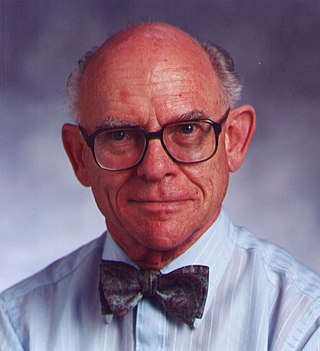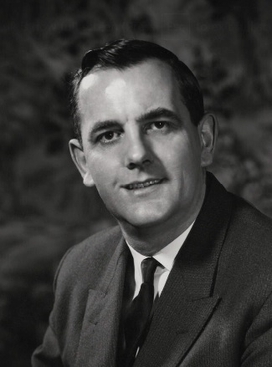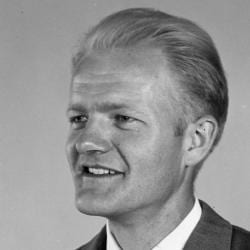
James Prescott Joule was an English physicist, mathematician and brewer, born in Salford, Lancashire. Joule studied the nature of heat, and discovered its relationship to mechanical work. This led to the law of conservation of energy, which in turn led to the development of the first law of thermodynamics. The SI derived unit of energy, the joule, is named after him.

Michael Smith was a British-born Canadian biochemist and businessman. He shared the 1993 Nobel Prize in Chemistry with Kary Mullis for his work in developing site-directed mutagenesis. Following a PhD in 1956 from the University of Manchester, he undertook postdoctoral research with Har Gobind Khorana at the British Columbia Research Council in Vancouver, British Columbia, Canada. Subsequently, Smith worked at the Fisheries Research Board of Canada Laboratory in Vancouver before being appointed a professor of biochemistry in the UBC Faculty of Medicine in 1966. Smith's career included roles as the founding director of the UBC Biotechnology Laboratory and the founding scientific leader of the Protein Engineering Network of Centres of Excellence (PENCE). In 1996 he was named Peter Wall Distinguished Professor of Biotechnology. Subsequently, he became the founding director of the Genome Sequencing Centre at the BC Cancer Research Centre.
Donald James Cram was an American chemist who shared the 1987 Nobel Prize in Chemistry with Jean-Marie Lehn and Charles J. Pedersen "for their development and use of molecules with structure-specific interactions of high selectivity." They were the founders of the field of host–guest chemistry.

George Andrew Olah was a Hungarian-American chemist. His research involved the generation and reactivity of carbocations via superacids. For this research, Olah was awarded a Nobel Prize in Chemistry in 1994 "for his contribution to carbocation chemistry." He was also awarded the Priestley Medal, the highest honor granted by the American Chemical Society and F.A. Cotton Medal for Excellence in Chemical Research of the American Chemical Society in 1996.

Andrew David Hamilton is a British American chemist and academic administrator who has served as the 16th president of New York University since 2016. He previously served as vice chancellor of the University of Oxford from 2009 to 2015 and provost of Yale University from 2004 to 2008.
The Manchester Literary and Philosophical Society, popularly known as the Lit. & Phil., is one of the oldest learned societies in the United Kingdom and second oldest provincial learned society.

Frank Albert Cotton FRS was an American chemist. He was the W.T. Doherty-Welch Foundation Chair and Distinguished Professor of Chemistry at Texas A&M University. He authored over 1600 scientific articles. Cotton was recognized for his research on the chemistry of the transition metals.

Sir Basil John Mason was an expert on cloud physics and former Director-General of the Meteorological Office from 1965 to 1983 and Chancellor of the University of Manchester Institute of Science and Technology (UMIST) from 1994 to 1996.
Fred Basolo was an American inorganic chemist. He received his Ph.D. at the University of Illinois at Urbana-Champaign in 1943, under Prof. John C. Bailar, Jr. Basolo spent his professional career at Northwestern University. He was a prolific contributor to the fields of coordination chemistry, organometallic, and bioinorganic chemistry, publishing over 400 papers. He supervised many Ph.D. students. With colleague Ralph Pearson, he co-authored the influential monograph "Mechanisms of Inorganic Reactions", which illuminated the importance of mechanisms involving coordination compounds. This work, which integrated concepts from ligand field theory and physical organic chemistry, signaled a shift from a highly descriptive nature of coordination chemistry to a more quantitative science.

Rolf Huisgen was a German chemist. His importance in synthetic organic chemistry extends to the enormous influence he had in post-war chemistry departments in Germany and Austria, due to a large number of his habilitants becoming professors. His major achievement was the development of the 1,3-dipolar cycloaddition reaction, also called the Huisgen cycloaddition.
Dale Lester Boger is an American medicinal and organic chemist and former chair of the Department of Chemistry at The Scripps Research Institute in La Jolla, CA.
Scott A. McLuckey is an American chemist, the John A. Leighty Distinguished Professor of Chemistry at Purdue University. His research concerns the formation of ionized versions of large biomolecules, mass spectrometry of these ions, and ion-ion reactions.
Ernest Ludwig Eliel was an organic chemist born in Cologne, Germany. Among his awards were the Priestley Medal in 1996 and the NAS Award for Chemistry in Service to Society in 1997.

The Department of Chemistry at the University of Manchester is one of the largest Departments of Chemistry in the United Kingdom, with over 600 undergraduate and more than 200 postgraduate research students.
The Charles Rees Award is granted by the Royal Society of Chemistry to "reward excellence in the field of heterocyclic chemistry". It was established in 2008 and is awarded biennially. The winner receives £2000, a medal and a certificate, and delivers a lecture at the Lakeland Symposium, Grasmere, UK. Winners are chosen by the Heterocyclic and Synthesis Group, overseen by the Organic Division Awards Committee.

Timothy M. Swager is an American Scientist and the John D. MacArthur Professor of Chemistry at the Massachusetts Institute of Technology. His research is at the interface of chemistry and materials science, with specific interests in carbon nanomaterials, polymers, and liquid crystals. He is an elected member of the National Academy of Sciences, American Academy of Arts and Sciences, and the National Academy of Inventors.
Subramania Ranganathan (1934–2016), popularly known as Ranga, was an Indian bioorganic chemist and professor and head of the department of chemistry at the Indian Institute of Technology, Kanpur. He was known for his studies on synthetic and mechanistic organic chemistry and was an elected fellow Indian National Science Academy, National Academy of Sciences, India and the Indian Academy of Sciences The Council of Scientific and Industrial Research, the apex agency of the Government of India for scientific research, awarded him the Shanti Swarup Bhatnagar Prize for Science and Technology, one of the highest Indian science awards, in 1977, for his contributions to chemical sciences.
Alfred Burger was a prominent chemist and a pioneer in medical chemistry. Burger was born in Vienna, the capitol of the Austro-Hungarian Empire, on 6 September 1905. He was the son of S. L. Burger and Clariss Burger.

Robert Nelson Smith was an American chemist who specialized in colloids. He taught at Pomona College in Claremont, California, from 1945 to 1982. He was chair of the college's chemistry department and was known for his practical jokes.










